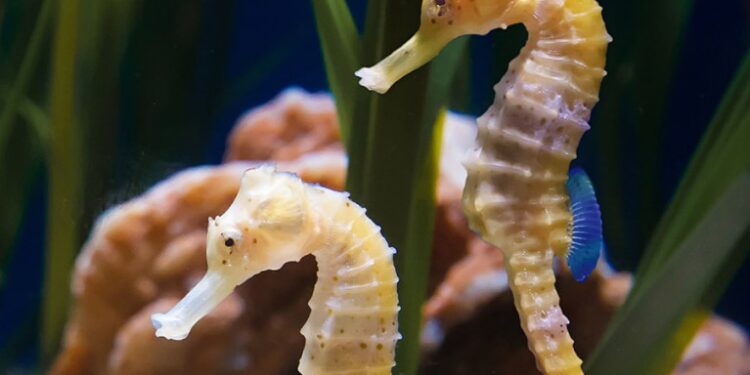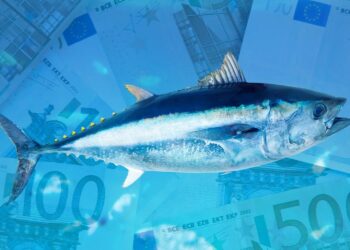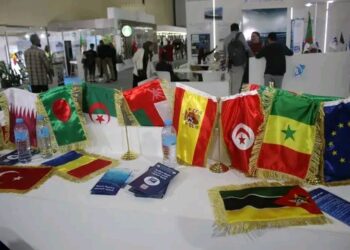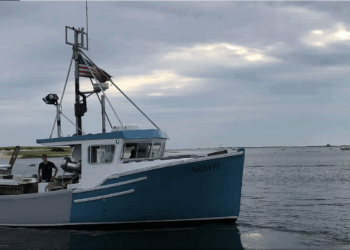150 seahorses were released into the Mar Piccolo of Taranto thanks to the Aquarium of Genoa
A release of 150 seahorses bred at the Aquarium of Genoa marks a new step for Mediterranean conservation efforts, supporting the recovery of weakened populations and strengthening the ecological resilience of the Mar Piccolo of Taranto in southern Italy.
Why seahorses are declining and why the Mar Piccolo of Taranto matters
Seahorses (Hippocampus guttulatus and Hippocampus hippocampus) are among the most fragile species of the Mediterranean. Their survival depends on habitats such as Posidonia oceanica meadows, coastal lagoons, and sheltered bays. Over the last decades, these habitats have dramatically shrunk: UNEP-coordinated studies estimate that over 30 percent of Mediterranean Posidonia meadows have disappeared since the 1960s, with urbanised areas showing local losses of 50–60 percent.
This loss translates directly into declining seahorse populations. Seahorses have low mobility, slow reproduction, and high dependence on microhabitats; once a population collapses, natural recovery becomes extremely unlikely.
The Mar Piccolo of Taranto historically hosted one of the most important seahorse populations in the Mediterranean. It is an inner bay characterised by unique habitats, submarine freshwater springs (the “citri”), protected areas, and strong internal currents. However, climate change has altered its stability. ARPA Puglia has documented an average +1.2°C increase in surface temperatures over the past 25 years, a shift that has weakened both the local ecology and the traditional mussel farms for which Taranto was once famous. Warmer summers, reduced oxygen, and changing hydrodynamics have placed long-term pressure on the entire ecosystem.
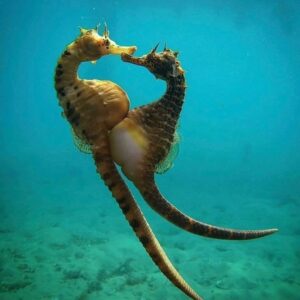
A scientifically guided release supported by controlled breeding
The release of 150 seahorses bred at the Aquarium of Genoa (https://www.acquariodigenova.it/)
is part of a broader strategy to reinforce depleted populations using aquaculture not for production, but for conservation. The Aquarium of Genoa is one of the few institutions in Europe capable of completing the entire controlled breeding cycle of seahorses: broodstock selection, larval rearing, gradual acclimatisation, and pre-release conditioning.
The Mar Piccolo’s complex ecology—freshwater inputs, variable salinity, sheltered basins, and structured benthic habitats—makes it a suitable location for reintroduction, provided that animals are properly adapted. The release protocol included stepwise acclimation to temperature, salinity, and local microfauna. Local monitoring teams will now assess survival, settlement patterns, and early reproduction using non-invasive techniques.
This initiative demonstrates how applied aquaculture science can actively support the restoration of biodiversity in areas where natural resilience has been compromised.
Restoring resilience in a climate-stressed inner lagoon
Reintroducing seahorses is not only about protecting a symbolic species; it also contributes to rebuilding the ecological balance of the Mar Piccolo. Seahorses are bioindicator organisms whose abundance reflects water quality, habitat integrity, and the condition of the invertebrate communities they feed on. Their recovery can drive broader conservation actions: protection of residual seagrass patches, reduction of turbidity, and mitigation of coastal runoff.
In several Mediterranean sites, successful seahorse restocking has also produced socio-economic benefits such as environmental education, citizen-science programs, and low-impact scientific tourism. The Mar Piccolo, long affected by industrial pressure and climate stress, fits this model: restoring its seahorse population aligns with ongoing regeneration initiatives and creates a new opportunity for community-based environmental engagement.
Why it matters in Blue Life Hub
- A flagship species for ecosystem recovery. Seahorses are sensitive to environmental change; their presence signals improving ecological conditions.
- A replicable Mediterranean model. The project links aquaria, scientists, and local authorities in a way that can be exported to other degraded lagoons.
- Climate resilience. In a lagoon affected by warming waters and the decline of historical mussel farming, restoring biodiversity helps stabilise ecological functions.
- A shift in aquaculture’s role. This initiative shows how aquaculture techniques can support conservation and not only commercial production.
- Community value. Restored seahorse populations can increase public awareness, scientific tourism, and citizen involvement in coastal stewardship.
150 seahorses were released into the Mar Piccolo of Taranto thanks to the Aquarium of Genoa

